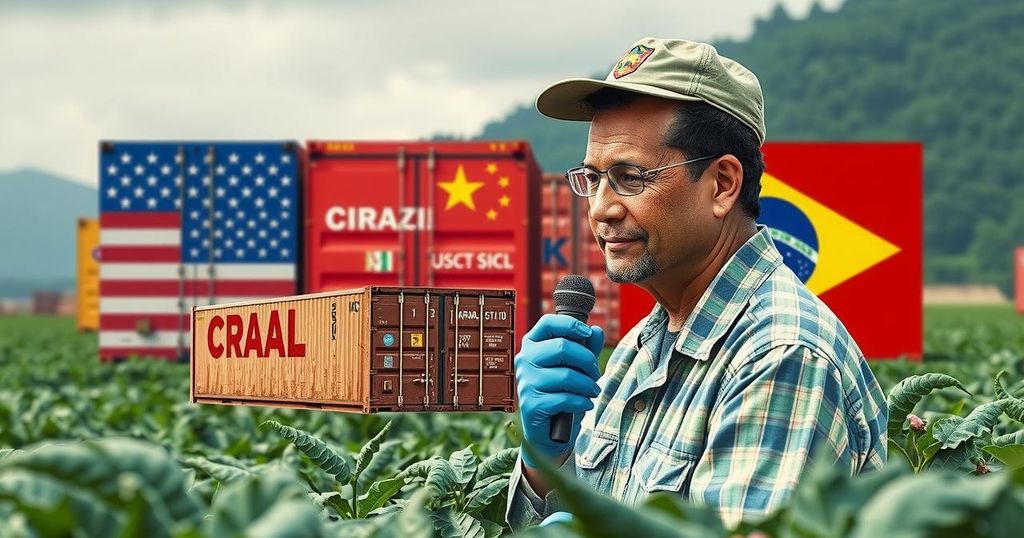Impact of Renewed Trade Wars on U.S. Farmers and Global Agricultural Trade
The Trump trade wars negatively impacted U.S. farmers, leading to an 79% decrease in soybean exports to China. As China shifts its sourcing to Brazil and other nations, American farmers confront mounting challenges amidst lower prices and increased competition. The evolving agricultural landscape demands that U.S. producers adapt strategically as they face potential tariff reinstatement and subsequent market shifts.
The ramifications of the Trump administration’s trade wars are poised to deepen for American farmers, particularly soybean growers, as China increasingly turns to Brazil for agricultural imports. The initial trade conflict resulted in significant losses to U.S. soybean exports, with a staggering 79% decline since Trump assumed office. Unlike the earlier scenario where China still required U.S. soybean supplies, China has since fortified its agricultural sourcing capabilities, importing from Brazil, Argentina, and Australia, thereby diminishing its reliance on American products.
As American farmers continue to struggle with low prices for corn and soybeans, there are concerns that escalating trade tensions could lead to a similar fallout as before, wherein retaliatory tariffs from China would depress grain prices further. Analysts from Citigroup indicate that, even with a potential resolution, China will likely have reduced interest in purchasing American agricultural commodities at previous levels. The agriculture sector faces a precarious situation as it contends with increasing competition from foreign suppliers and the challenges of a saturated global market.
The first trade war catalyzed a shift in planting patterns, prompting Brazil to boost its soybean production, resulting in anticipated harvests that exceed previous output levels significantly. This changing landscape is underscored by a record U.S. soybean crop carried out amidst mounting domestic demand. Despite potential declines in demand due to renewed trade tensions, farmers are expected to maintain planting rates, largely due to governmental financial support provided during earlier trade disputes.
Recent analysis highlights various crops that may be notably affected. Specifically, a re-establishment of tariffs could result in substantial losses of millions of tons in grain and soybean exports from the U.S. Meanwhile, China’s pivot toward Brazilian corn and wheat, and its authorization for imports from Argentina, further indicates a strategic diversifying of supply sources.
Competition extends to sorghum and pork markets as well, with American producers facing increasing challenges from Brazil’s burgeoning output in sorghum and the shifting dynamics in pork consumption preferences in China. Additionally, while cotton imports from the U.S. may experience declines due to strong domestic production in China, the overall demand for textiles appears to be weakening, underscoring a changing economic landscape. The trade and agricultural policies during this period will undoubtedly affect U.S. farmers’ market shares and future prospects significantly.
The article examines the ongoing implications of the Trump administration’s trade conflicts on U.S. farmers, especially those in the soybean sector. Initially, the trade war resulted in a drastic reduction in American soybean exports to China, leading to billions in losses. Over time, China has adapted by diversifying its import sources, now increasingly favoring Brazil over U.S. commodities. The article further delves into how these shifts reflect broader changes in global agricultural trade dynamics, emphasizing the competitive challenges faced by American producers as they navigate lower profit margins and shifting demand signals.
In summary, American farmers, particularly those in the soybean industry, are set to face intensified challenges as China’s agricultural import strategies evolve. The previous trade wars resulted in significant export losses, and as China turns to Brazil for its supply needs, American farmers risk facing further decreases in market share and price pressures. Despite these adversities, growers are likely to maintain their planting levels due to prior government assistance and ongoing domestic demand, yet the long-term outlook remains precarious amid growing competition from abroad.
Original Source: www.detroitnews.com




Post Comment